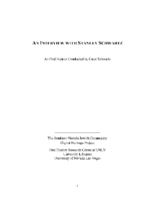Search the Special Collections and Archives Portal
Search Results

Transcript of interview with Stanley Schwartz by Carol Schwartz, March 1, 1980
Date
Archival Collection
Description
Interview with Stanley Schwartz by Carol Schwartz on March 1, 1980. Stanley talks about coming to Las Vegas in 1951 to open a clothing business on Main Street, Schwartz Brothers Clothing. He compares the business district of the 1950s to the district in 1980, and advertising opportunities in the newspapers and on the radio. Schwartz talks about suit styles and changing preferences of buyers, and moving the store to Second Street, then Fremont Street, then to Maryland Square Shopping Center. In 1970, he changed the focus of the clothing store to "big and tall" and talks about the importance of customer service in retaining customers. He mentions Al Benedict and Herb Tobman as people he admired.
Text

Luis F. Valera interview, January 23, 2019: transcript
Date
Archival Collection
Description
Interviewed by Nathalie Martinez. Laurents Bañuelos-Benitez also participates in the questioning. Luis F. Valera serves as the Vice President of Government Affairs at UNLV. His heritage is from Venezuela and Cuba. He has served as the Chairman of the Latin Chamber of Commerce and has been an active member of the Latino community since his pursuing his undergraduate degree at UNLV in Political Science and his Juris Doctorate degree from the William S. Boyd School of Law. His various achievements in the community and nation led him to become recognized and awarded the Arturo Cambeiro Hispanic of the Year Award in 2011.
Text

Mario C. Monaco interview, March 12, 1981: transcript
Date
Archival Collection
Description
On March 12, 1981, Kim Rhodes interviewed Mario C. Monaco (born in Italy) about his life as an educator in Las Vegas, Nevada. During the interview, Monaco speaks about his various teaching positions, how he ended up in Las Vegas, the changes seen in the Clark County School District and how it compares to educational districts throughout the nation. Moreover, Monaco discusses wages and teacher education opportunities, sports and extracurricular activities in school, community involvement, and racial integration through busing. Lastly, Monaco talks about his appointment to Director of Vocational Education in the Clark County School Districts, the programs offered by the vocational center in the valley and the importance of education.
Text

LeMoyne Legere interview, March 17, 1977: transcript
Date
Archival Collection
Description
On March 17, 1977, collector Cecilia Branch interviewed LeMoyne Legere (born in 1935) at her residence in Las Vegas, Nevada. In this interview, Mrs. Legere discusses various differences in Las Vegas from the time she was growing up to the date of the interview. She also discusses her involvement in high school and what people do for recreation.
Text

Don Perry interview, March 05, 1978: transcript
Date
Archival Collection
Description
On March 5th, 1978, Karen Croteau interviewed Don Perry (b. 1928 in Clarksburg, West Virginia) about Paiute Indians and life on a reservation. Perry begins by mentioning his own Indian heritage with a Cherokee mother and his wife’s Paiute heritage. Perry focuses on his conversations with his wife’s grandmother, who lived on the Paiute reservation since birth, from who he learned about the reservations history. He particularly delves into the traditions of Indian burials, governing on the reservation, and the difference between an Indian reservation and an Indian colony. Additionally, he talks about recreation on the reservations, education of Paiute Indians, and how reservations have changed. Throughout the interview, Perry gives personal anecdotes about his life in connection to the Paiute people and his experiences with their traditions and belief systems. Perry ends by discussing governing politics of the Paiute reservation and the start of Las Vegas as a gambling town.
Text

Transcript of interview with Flora Hannig-Kellar by Michael Taylor, March 27, 1981
Date
Archival Collection
Description
On March 27th, 1981, collector Michael D. Taylor interviewed housewife Flora Hannig-Kellar (born January 24th, 1902 in Washington, Utah) in Henderson, Nevada. This interview is Flora Hannig-Kellar’s personal account on growing up in Nevada. She discusses home and family life and local social and recreational activities. During the interview Mrs. Hannig-Kellar also shares some of the poetry she wrote about Nevada and her family, specifically her children and grandchildren.
Text

Transcript of interview with Lawrence Hawley by Andy Sturgeon, March 13, 1981
Date
Archival Collection
Description
On March 13, 1981, Andy Sturgeon interviewed attorney Lawrence Hawley in his office on 302 East Carson Street, Las Vegas, Nevada. The two discuss how Hawley first came to Nevada, as well as his personal family history. Hawley describes Hoover Dam as it was being built, the effects of the Depression on Nevada, and how Las Vegas has grown in size. Hawley also discusses liquor laws and how practicing law has changed since he first moved to Nevada.
Text

Transcript of interview with Juanita Kilburg by Vincente C. Camacho, March 7, 1981
Date
Archival Collection
Description
On March 7, 1981, Vicente C. Camacho interviewed accounting clerk, Juanita Kilburg (born September 25th, 1923 in Los Angeles, California) on the second floor of the UNLV Dickinson Library. Kilburg explains how her family first moved to Southern Nevada and her father’s ties to the railroad. She then goes on to explain the growth of the military and Nellis Air Force Base. The interview concludes with a discussion on her work with the American Legion service organization.
Text

Transcript of interview with Elbert Edwards by Layne Covington, October 16, 1986
Date
Archival Collection
Description
On October 16, 1986, Layne Covington interviewed Elbert Edwards (born 1907 in Panaca, Nevada) about his life in Southern Nevada. Edwards first talks about his family background before talking about what it was like to live in Panaca. He then talks about changes in Southern Nevada, particularly those in Boulder City that have taken place over time. Edwards later talks about the work of his wife and both of their political involvement and his involvement and career in education. The latter part of the interview includes discussion of the building of Boulder Dam, Edwards’ job as a registrar in the Selective Service, and the effects that the war years had on Las Vegas.
Text

Aracely Rascon oral history interview: transcript
Date
Archival Collection
Description
Oral history interview with Aracely Rascon conducted by Claytee D. White on October 2, 2018 for the Remembering 1 October Oral History Project. In this interview, Rascon recalls her early childhood in Chihuahua, Mexico and until her father brought the family to Las Vegas, Nevada. She studied interior design at the University of Nevada, Las Vegas (UNLV) and joined the firm of Simpson Coulter, where she specializes in decorating the interiors of businesses and schools. Two weeks after the October 1, 2017 shooting, her skills were called upon by those across the city who were preparing the Resiliency Center for survivors of the mass shooting. This proposed Resiliency Center needed carpet, paint, furniture, art work, and everything else to make it into a place where people could seek assistance in a peaceful atmosphere where they could tell their stories and ask for help. Rascon contacted all her resources and was pleasantly surprised when each company bent over backwards to offer deals, advice, and referrals. Rascon learned that she could use her talents and decorating skills to help others be at peace and to dialogue and perform in comfort. She will never forget and will be forever grateful to the sense of community displayed by her city.
Text
